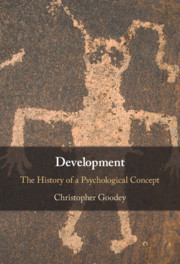Book contents
- Development
- Development
- Copyright page
- Contents
- Acknowledgements
- Introduction
- Chapter 1 Development and the Origin of Psychological Concepts
- Chapter 2 The History of Christianity and the First Principles of Development: Linear Time, Interiority, Structure
- Chapter 3 The History of Education: Rearing the Elect Child
- Chapter 4 Pascal on the Ordering of Human Time
- Chapter 5 The Normalization of the Elect: Locke to Montesquieu
- Chapter 6 The Coining of a Developmental Theory: Leibniz to Bonnet
- Chapter 7 Emile: Rousseau’s Well-Ordered Developer
- Chapter 8 Nature versus Nurture and Cognitive Ability Testing: Historical Sketches
- Postscript Further Targets for Historical Research
- Index
Chapter 8 - Nature versus Nurture and Cognitive Ability Testing: Historical Sketches
Published online by Cambridge University Press: 10 June 2021
- Development
- Development
- Copyright page
- Contents
- Acknowledgements
- Introduction
- Chapter 1 Development and the Origin of Psychological Concepts
- Chapter 2 The History of Christianity and the First Principles of Development: Linear Time, Interiority, Structure
- Chapter 3 The History of Education: Rearing the Elect Child
- Chapter 4 Pascal on the Ordering of Human Time
- Chapter 5 The Normalization of the Elect: Locke to Montesquieu
- Chapter 6 The Coining of a Developmental Theory: Leibniz to Bonnet
- Chapter 7 Emile: Rousseau’s Well-Ordered Developer
- Chapter 8 Nature versus Nurture and Cognitive Ability Testing: Historical Sketches
- Postscript Further Targets for Historical Research
- Index
Summary
The previous themes reach into modern debates about freedom and necessity, which are still central in education and psychology today. Contributing to the rise of formal disciplines of developmental and child psychology, educational psychology, clinical psychology and cognitive psychology, as well as psychiatry, empirical approaches based on sense perception began in the mid-eighteenth century; but they are equally the outcome of broader religious and cultural influences. The book therefore concludes with an overview of the direct traces on the modern disciplines of the religious ideas discussed in earlier chapters: in Britain through David Hartley, Joseph Priestley and Francis Galton, and the nature-versus-nurture formula; and in France Hippolyte Taine, Alfred Binet (creator of the ‘mental age’ score, subsequently IQ measurement) and Jean Piaget himself.
Keywords
- Type
- Chapter
- Information
- DevelopmentThe History of a Psychological Concept, pp. 186 - 204Publisher: Cambridge University PressPrint publication year: 2021

